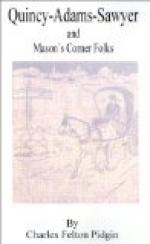“Did you ever kill a chicken?” asked Uncle Ike, as Quincy entered the room and took a seat in the willow rocker Uncle Ike pointed out to him.
“No,” replied Quincy, “but out in Chicago I saw live hogs killed, bristles taken off, cut up, assorted according to kind and quality, and hung up to cool off, in three minutes.”
Uncle Ike responded vehemently, “Yes, I know, and it is a shame to the American people that they allow such things.”
“That may be true,” said Quincy, “but even at that speed they cannot kill and pack as fast as it is wanted.”
“Yes,” said Uncle Ike, “in the old days man feared God, and he treated man and beast better for that reason. In these days man serves Mammon and he will do anything to win his favor.”
“Do you think it is true that men were better in the old days?” asked Quincy.
“No,” answered Uncle Ike, “I didn’t say so. I said that in the old days man was afraid to do these things; now if he has money he is afraid of neither God, man, nor the devil. To speak frankly, that is why I am so independent myself. I am sure of enough to support me as long as I live; I owe no man anything, and I allow no man to owe me anything.”
Quincy, changing the subject, inquired, “What is your method of killing chickens?”
Uncle Ike said, “Let me tell you why I devised a new plan. When I was about eight years old I went with my mother to visit an uncle in a neighboring town. I was born in Eastborough myself, in the old Pettengill house. But this happened some twenty miles from here. My uncle was chopping wood, and boy like, I went out to watch him. An old rooster kept running around the block, flapping its wings, making considerable noise. Uncle shooed him off three or four times. Finally uncle made a grab at him, caught him by the legs, whacked him down on the block and with his axe cut off his head close to his body, and then threw it out on the grass right in front of me. Was that rooster dead? I thought not. It got up on its legs, ran right towards where I was sitting, and before I could get away I was covered with the blood that came from its neck. I don’t know how far the rooster ran, but I know I never stopped until I was safe in my mother’s arms. The balance of the time I stayed there you couldn’t get me within forty yards of my uncle, for every time I met him I could see myself running around without my head.”
“That made a lasting impression on you,” remarked Quincy.
“Yes,” said Uncle Ike, “it has lasted me sixty-eight years, one month, and thirteen days,” pointing to a calendar that hung on the wall.
As Quincy looked in the direction indicated he saw something hanging beside it that attracted his attention.
It was a sheet of white paper with a heavy black border. Within the border were written these words, “Sacred to the memory of Isaac Pettengill, who was killed at the battle of Gettysburg, July 4th, 1863, aged twenty-nine years. He died for his namesake and his native land.”




